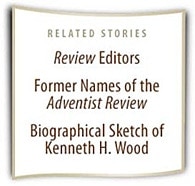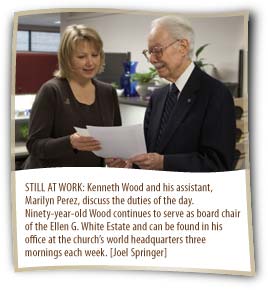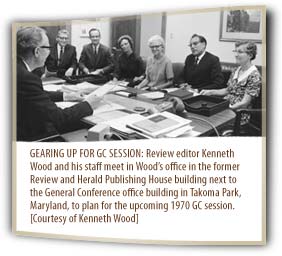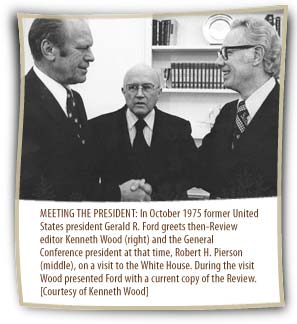
dventist Review
assistant editor Sandra Blackmer talks with former Review
editor in chief Kenneth H. Wood about his continuing work for the church after turning 90, the role the Adventist Church’s general paper played in the life of the church throughout his 27 years with the publication, and how he envisions the future of the church.
BLACKMER: Elder Wood, you officially retired in 1982 after serving the church for more than 44 years, 27 of them with the Review. You recently celebrated your ninetieth birthday on November 5. But you continue to serve as board chair of the Ellen G. White Estate—a position you’ve held since 1980—and you faithfully come in to the office three mornings a week. Why do you do it?
WOOD: Well, I’m a little bit like Cal Ripken, the baseball shortstop who set a record for consecutive games played. He never had any thought of setting a record. He said, “I just went to work every day.” Going to work has just always been a part of my life and my work ethic.
From the moment I joined the White Estate staff, they handed me work to do, and ever since there has been work to do editing the White Estate publications.
So you just keep going?
Exactly.
Any plans to fully retire?
I certainly plan to retire at the end of this term. I was elected for five years. I was surprised when they reelected a man my age, but I doubt they will do it again. I still enjoy the work.
 It comforted me when Tim Poirier, who is vice director of the White Estate and a wonderful asset to our department, was quoted in the General Conference in-house newsletter as saying that I don’t just come to work, but I make a contribution—I took that as very high praise. But the moment I feel I’m not making a contribution, I don’t want to be here. I want somebody else to do it.
It comforted me when Tim Poirier, who is vice director of the White Estate and a wonderful asset to our department, was quoted in the General Conference in-house newsletter as saying that I don’t just come to work, but I make a contribution—I took that as very high praise. But the moment I feel I’m not making a contribution, I don’t want to be here. I want somebody else to do it.
Let’s go back to when you were serving at the helm of the Adventist Review. What role, or mission, did you see this paper playing in the life of the church at that time?
It was a very difficult time back then because of several controversies happening in the church. One was over righteousness by faith—that was a hot issue. Even some church leaders at the time were divided on the issue. Some leaned toward the Calvinistic idea that only justification and not sanctification was important. Another controversy was over 1844. So I considered we were under siege, as it were—[the Review editors] were sort of keeping our finger in the dike, a defender of the faith. But I believe the church came through that period stronger than it was before.
Do you think church members looked to the Review for direction during those times?
Absolutely. It was like the old saying: “If I read it in the newspaper, it must be true.” If the Review said it, that gave it tremendous weight and authority. That was especially true when it was a “we” situation and not just an “I” situation. That means if there was a doctrinal or policy problem, we would ask the GC vice presidents—whom we called contributing editors—to read the articles, too, so when they were published, they tended to reflect fairly accurately the viewpoints of not merely the editorial staff but church leadership as well.
I looked on the church paper as a voice to influence the church rather than just a mouthpiece reflecting what was happening in it. From its very beginnings the Review had a lot to do with shaping the church.
When you were editor, what was your vision of where you wanted to see the church go?
Well, former General Conference president Robert H. Pierson and I were elected at the same time. Revival and reformation were his theme, and my goal was for the church to always have a distinctive Adventist flavor—a unique sound. There is no reason for us to exist if we don’t have something special to offer the world. And that specialness must be reflected in everything we do and everything that goes into the church paper.
I believe the Adventist message enables people to reach their fullest potential intellectually, physically, spiritually. It’s a wonderful message, and I just wish everyone could see it in that light. To me, the so-called restrictions of Adventism are not negative. I see them all as positive. But I wonder sometimes how good a job we’re doing as church leaders of sharing this message. So there again, the Review needs to hold up the beliefs and doctrines of the church, because many are not doing it from the pulpit.
You seemed to be ahead of your time in your sensitivity for gender-inclusive language. You wrote an editorial about that subject in 1975. And it was under your leadership that the first women were appointed as assistant editors of the Review—Jocelyn Fay in 1977 and Aileen Sox in 1980. From where did that sensitivity and support of women in leadership roles arise—because back then it wasn’t a prominent notion?
I think it came from several sources, but one of them was that my wife and I would read from an Ellen White devotional book for morning worship, and every time I read where it said “men” I sensed that Miriam felt excluded. And I thought, This is unfortunate. Ellen White didn’t mean just the masculine. In many cases, she herself changed the pronoun several times on a page to be inclusive.
And I believe that if we are open to the Holy Spirit, He creates a sensitivity on points we should be sensitive about. I believe it was the Holy Spirit speaking to me that made me sensitive to how Miriam and other women felt.
 So you support women in church leadership?
So you support women in church leadership?Yes, I do, because women have viewpoints that men don’t have. And the church is a totality—it’s not a “man thing” or a “woman thing.” God made both men and women. Each has something to contribute.
Describe one or two of the other major changes in the publication itself that you spearheaded.
We changed the name of the magazine. The title Review and Herald was not specific; it was vague. Was it two magazines? Then I discovered in South America it was called Revista Adventista, and in French it was Revue Adventiste, and I thought we needed to be consistent. The name Adventist Review makes a statement immediately. I thought it was the right time to make the change, and the Review board approved.
We also introduced the Letters to the Editor section. I thought that would increase interest in the magazine and encourage reader involvement. And we began a new policy on publishing obituaries. The church had been relatively small up until then, and we published every obituary sent to us. Eventually, the volume became unmanageable, so we had to eliminate some obituaries. If it were of a church leader or a well-known layperson, we would publish it.
Just to put church growth into perspective, when I was born in 1917 world membership was a little under 154,000. When I first entered church work in 1938, membership had grown to almost 470,000. Today, we’ve surpassed 15 million baptized members worldwide.
Other than ones already mentioned, what were some of the other “hot” issues or topics you addressed in the Review?
Higher Adventist education was one. Lifestyle issues was another. One reason I addressed issues “where the rubber meets the road” was because of Elder Nichol’s [Review editor preceding Wood] example. Although he dealt with theology, he also dealt with many grassroots issues. Consequently, I felt that anything that deals with the Adventist lifestyle is something we should talk about. Many people were looking for guidance on those things.
Was any subject taboo?
No. But we took great care on how we handled particularly sensitive or controversial topics.
What about racial issues?
I wrote about those, as well. I was in the Columbia Union when the first regional conference was organized in Allegheny. It’s hard to believe that at that time whenever there was a workers’ meeting at the Review and Herald Publishing house the races were segregated during lunchtime. Columbia Union College didn’t have one Black student, and Washington Adventist Hospital didn’t have one Black patient.
Times were so different then, but, sadly, prejudice has not all gone away yet. That’s true even in the Adventist Church.
The Review also dealt with the topic of UFOs.
Yes, that was Nichol. He went out to Dayton, Ohio, to the Air Force base there and interviewed people. That was shortly after I joined the staff.
I did write an editorial about landing on the moon. Some people at the time didn’t believe that would ever happen. I’m glad when I look back on some of the things I’ve written that I didn’t “go out on a limb” on issues like that.
How did you provide artwork for the Review?
We had no extra help with artwork. We would take old artwork cuts that might have been published in the magazine 20 years before, and if we could possibly use them, we would. As far as the magazine itself is concerned, we just pasted it up. There wasn’t much flexibility.
Does the church’s leading magazine have a responsibility to help readers understand a godly approach to social issues and politics, or is it better to stay clear of such topics?
That, of course, is a very controversial question. And there’s probably not an easy answer to it. I feel that the Bible gives us good examples on that. There were lots of social problems throughout the centuries the Bible was being written. God often called His people to deal with them. But when Christ was here on earth, He knew the real need of people was to have a relationship with the heavenly Father.
The church paper needs to stay completely clear of advocating political candidates. There’s little that causes more division than that. Again and again both the Bible and the Spirit of Prophecy appeal for unity in the church. That doesn’t mean, however, that we need to be blind to serious social situations. But, generally, we should deal with the principles involved with social issues rather than confronting them as isolated issues.
You’ve been described as a very candid conservative with large ideas. Would you agree with that assessment?
I hope that’s true. I tried to be on the cutting edge of everything without being radical. I’ve always been open to examining new ideas, but I made very sure they were consistent with what I believe.
 Wikipedia online says your “editorship has been noted for its uncritical stance toward the church in contrast to journals . . . that began to force the church to look more candidly at issues.” How do you respond to that?
Wikipedia online says your “editorship has been noted for its uncritical stance toward the church in contrast to journals . . . that began to force the church to look more candidly at issues.” How do you respond to that?Well, my concept was to have a mix on that. I was not happy with the approach used by some so-called Adventist publications because I thought they were more critical than supportive. I tried to call the church to account where I felt it had strayed, but I am very much against anybody who tears it down. I feel very defensive over the church, the body of Christ. So that evaluation of Wikipedia is probably fairly accurate.
You and your wife, Miriam, wrote a book published in 1967 about the life of Francis D. Nichol. You succeeded Nichol as editor of the Review after his sudden death from a tear in his aorta on the eve of a General Conference session. Tell me about that time of transition.
That was really a time of crisis. Elder Nichol was walking home from the Review, as he did every day. On the way he felt this pain in his chest, and he was taken to the hospital, where he later died. This was just three or four days before the General Conference session was to begin in Detroit.
It seems that timing couldn’t have been any worse.
It was terrible. The day after his death the general manager of the Review called me into his office and asked, “Do you think we can still publish the daily bulletins for the session?” I said, “Absolutely,” so the Executive Committee met and asked me to serve as acting editor. Then a day after the General Conference session ended, the Review board and the General Conference Committee met and officially elected me as editor.
How did you feel about that?
Awestruck. I felt that by the grace of the Lord I could do it, but that it would be a terrific challenge.
What was your most discouraging day as editor in chief of the Review?
I don’t think I ever had a discouraging day. Every day, though, was a trial in many ways. I had to depend on the Lord for grace and wisdom and strength. I felt we were in a fierce battle between truth and error.
What is the most humorous experience you can remember?
A mistake I made. I wrote an editorial once and referred to a man in the Bible who was given 10 talents. Then a reader wrote in and asked, “Where is that story in the Bible? I only know about the man with five talents.” So I looked it up, and, of course, he was right. I was just writing off-the-cuff. From then on, I checked everything.
Complete the following sentence: If I could do it all over again, knowing what I know now, I would . . .
I would ask the Lord to again just take my life and lead me, because Ellen White says that when we get to heaven we’ll look back and say that we would not choose to be led any other way than how He led us. Today, I say, “Lord, what a privilege it’s been to be of service. I don’t know how You got me here, but thank You—I’ve enjoyed every minute of it.” I’m a happy person. The Lord is good.
 Some say the Adventist Church has become so fragmented in its beliefs and practices that continued unity isn’t possible. What do you say to that?
Some say the Adventist Church has become so fragmented in its beliefs and practices that continued unity isn’t possible. What do you say to that?I have no question about whether we’re going to stick together. The Spirit works in different ways, but if we all stay close to the Lord, I believe the church will do well.
Is the Review still important for Adventists today?
The Review has a history that has meant so much to this church that it should be its most important magazine. It has the potential to help shape the church and to encourage our believers—setting a high standard in a bewildering world. It needs to be a trumpet giving a good sound and having a powerful influence. I think it should even have a foot-stamping quality at times.
I can’t end the interview without asking: What’s your secret to long life?
Well, I don’t think I’d be here today if it weren’t for the Adventist health message. I have strongly believed the counsel of the Spirit of Prophecy. I’m a vegetarian. I’ve tried to follow the health principles. I live a very disciplined life when it comes to rest and eating a balanced diet. I’m especially thankful for two things: good eyesight and, as my grandfather used to say, “the right use of my mind.”
But above all, I count it a great blessing of the Lord. I believe that being happy in the Lord helps a person in every way. I just marvel and thank Him for 90 wonderful years. If we cooperate with Him, He can do great things.
___________
Sandra Blackmer is an assistant editor of Adventist Review.

 It comforted me when Tim Poirier, who is vice director of the White Estate and a wonderful asset to our department, was quoted in the General Conference in-house newsletter as saying that I don’t just come to work, but I make a contribution—I took that as very high praise. But the moment I feel I’m not making a contribution, I don’t want to be here. I want somebody else to do it.
It comforted me when Tim Poirier, who is vice director of the White Estate and a wonderful asset to our department, was quoted in the General Conference in-house newsletter as saying that I don’t just come to work, but I make a contribution—I took that as very high praise. But the moment I feel I’m not making a contribution, I don’t want to be here. I want somebody else to do it. So you support women in church leadership?
So you support women in church leadership? Wikipedia online says your “editorship has been noted for its uncritical stance toward the church in contrast to journals . . . that began to force the church to look more candidly at issues.” How do you respond to that?
Wikipedia online says your “editorship has been noted for its uncritical stance toward the church in contrast to journals . . . that began to force the church to look more candidly at issues.” How do you respond to that? Some say the Adventist Church has become so fragmented in its beliefs and practices that continued unity isn’t possible. What do you say to that?
Some say the Adventist Church has become so fragmented in its beliefs and practices that continued unity isn’t possible. What do you say to that?